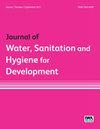影响尼日利亚东北部流离失所者营地霍乱疫情复发的环境、社会和讲卫生运动因素:快速评估
IF 1.4
4区 环境科学与生态学
Q3 WATER RESOURCES
Journal of Water Sanitation and Hygiene for Development
Pub Date : 2023-07-11
DOI:10.2166/washdev.2023.055
引用次数: 1
摘要
2021年,尼日利亚爆发了严重的霍乱疫情,影响了博尔诺州,当时该州居住着160多万国内流离失所者。这项快速评估探讨了尼日利亚东北部境内流离失所者收容地霍乱疫情复发的因素。对博尔诺州10个流离失所者营地的水、环境卫生和个人卫生(WASH)、管理人员和医护人员进行了半结构化访谈。访谈得到了样带行走和实地观察、游离余氯水平测量以及国际移民组织流离失所追踪矩阵公布的公开数据的补充。国内流离失所者与收容社区之间的大量互动,以及营地中的讲卫生服务不理想,似乎有助于霍乱疫情的复发。特别令人关切的是,国内流离失所者营地面临与极端天气有关的事件,这些事件破坏了设施,随后影响了讲卫生运动的做法。难民营的讲卫生服务也可能因新移民的涌入而受到严重阻碍。最后,我们强调将讲卫生运动活动扩大到东道社区的重要性,并制定特定地点的讲卫生运动干预措施和氯化目标。需要为预防和控制与极端天气有关的事件和人口涌入后的疫情提出切实可行的建议。本文章由计算机程序翻译,如有差异,请以英文原文为准。
Environmental, social, and WASH factors affecting the recurrence of cholera outbreaks in displacement camps in northeast Nigeria: a rapid appraisal
In 2021, Nigeria witnessed a severe cholera outbreak that affected Borno state, in which more than 1,600,000 internally displaced persons (IDPs) resided at the time. This rapid appraisal explored factors that facilitate the recurrence of cholera outbreaks in sites hosting IDPs in Northeast Nigeria. Semi-structured interviews were conducted with water, sanitation, and hygiene (WASH), management, and healthcare personnel working in 10 displacement camps in Borno state. The interviews were complemented by transect walks and field observations, measurements of free residual chlorine levels, and publicly available data published by the International Organization for Migration Displacement Tracking Matrix. The recurrence of cholera outbreaks appears to be facilitated by substantial interactions between IDPs and host communities, and suboptimal WASH services in camps. Of particular concern, IDP camps are exposed to extreme weather-related events that damage facilities and subsequently affect WASH practices. WASH services in camps may likewise be severely hindered by an influx of new arrivals. In conclusion, we emphasize the importance of expanding WASH activities to host communities and developing site-specific WASH interventions and chlorination targets. Practical recommendations are needed for the prevention and control of outbreaks following extreme weather-related events and population influxes.
求助全文
通过发布文献求助,成功后即可免费获取论文全文。
去求助
来源期刊

Journal of Water Sanitation and Hygiene for Development
WATER RESOURCES-
CiteScore
3.10
自引率
11.80%
发文量
58
审稿时长
16 weeks
期刊介绍:
The Journal of Water, Sanitation and Hygiene for Development is a peer-reviewed journal devoted to the dissemination of high-quality information on the science, policy and practice of drinking-water supply, sanitation and hygiene at local, national and international levels.
 求助内容:
求助内容: 应助结果提醒方式:
应助结果提醒方式:


